Related Research Articles

Papua New Guinea is a country in Oceania that comprises the eastern half of the island of New Guinea and its offshore islands in Melanesia. Officially the Independent State of Papua New Guinea, it shares its only land border with Indonesia to the west and it is directly adjacent to Australia to the south and the Solomon Islands to the east. Its capital, located along its southeastern coast, is Port Moresby. The country is the world's third largest island country, with an area of 462,840 km2 (178,700 sq mi).

The politics of Papua New Guinea takes place in a framework of a parliamentary representative democratic multi-party system, whereby the prime minister is the head of government. Papua New Guinea is an independent Commonwealth realm, with the monarch serving as head of state and a governor-general, nominated by the National Parliament, serving as their representative. Executive power is exercised by the government. Legislative power is vested in both the government and parliament.

Solomon Islands is a country consisting of six major islands and over 900 smaller islands in Melanesia, part of Oceania, to the northeast of Australia. It is directly adjacent to Papua New Guinea to the northwest, Australia to the southwest, New Caledonia and Vanuatu to the southeast, Fiji, Wallis and Futuna, and Tuvalu to the east, and Nauru and the Federated States of Micronesia to the north. It has a total area of 30,407 square kilometres, and a population of 734,887 according to the official estimates for mid 2023. Its capital, Honiara, is located on the largest island, Guadalcanal. The country takes its name from the wider area of the Solomon Islands (archipelago), which is a collection of Melanesian islands that also includes the Autonomous Region of Bougainville, but excludes the Santa Cruz Islands.

For administrative purposes, Papua New Guinea is divided into administrative divisions called provinces. There are 22 provincial-level divisions, which include 20 provinces, the Autonomous Region of Bougainville, and the National Capital District of Port Moresby.

Bougainville, an autonomous region of Papua New Guinea (PNG), has been inhabited by humans for at least 29,000 years, according to artefacts found in Kilu Cave on Buka Island. The region is named after Bougainville Island, the largest island of the Solomon Islands archipelago, but also contains a number of smaller islands.
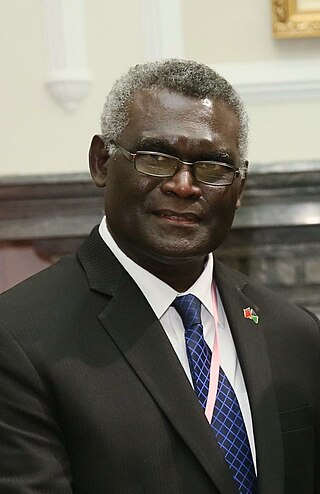
Manasseh Damukana Sogavare is the prime minister of Solomon Islands, serving since 24 April 2019. He previously held the office in 2000–2001, 2006–2007 and 2014–2017; in all he has served over nine years as prime minister. Before becoming prime minister, Sogavare served in the National Parliament representing East Choiseul since 1997.

Fred Iro Fono was a Solomon Islands politician, serving as the country's Deputy Prime Minister and Minister for Rural Development and Indigenous Affairs from December 2007 to August 2010. He was a member of the People's Alliance Party and represented Central Kwara'ae Constituency in the National Parliament for thirteen years from 1997 to 2010, when he was defeated for re-election by MP Jackson Fiulaua.
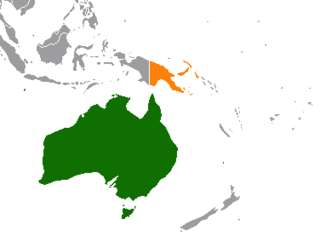
Foreign relations exist between Australia and Papua New Guinea. Papua New Guinea is Australia's closest neighbour and a former colony of Australia. Both nations share the same continent in the Oceania region. Papua New Guinea has developed much closer relations with Australia than with Indonesia, the only country with which it shares a land border. The two countries are Commonwealth realms. In contemporary times, Papua New Guinea is one of the largest recipients of Australian aid. Some critics have pointed to instances where this has led to an outsized Australian influence on Papua New Guinea politics.

Samuel Manetoali is a member of the National Parliament of the Solomon Islands. He represents the Gao/Bugotu constituency in Isabel Province.

John Momis is a Bougainvillean politician who served as the President of the Autonomous Region of Bougainville in Papua New Guinea between 2010 and 2020.

Peter Shannel Agovaka is a Solomon Islands politician.
Joses Tuhanuku is a Solomon Islands politician and former trade union leader. He served three terms in Parliament before losing his seat in the 2006 general election.
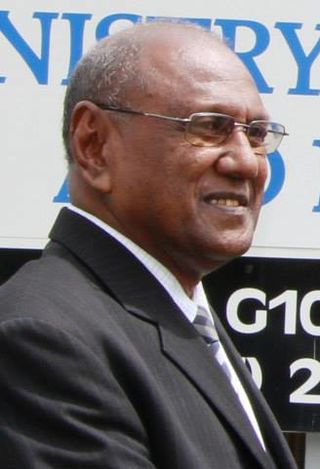
George Milner Tozaka OBE, better known as Milner Tozaka, is a Solomon Islands diplomat and politician.
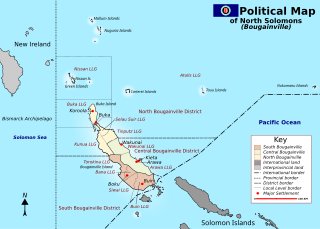
The Bougainville conflict, also known as the Bougainville Civil War, was a multi-layered armed conflict fought from 1988 to 1998 in the North Solomons Province of Papua New Guinea (PNG) between PNG and the secessionist forces of the Bougainville Revolutionary Army (BRA), and between the BRA and other armed groups on Bougainville. The conflict was described by Bougainvillean President John Momis as the largest conflict in Oceania since the end of World War II in 1945, with an estimated 15,000–20,000 Bougainvilleans dead, although lower estimates place the toll at around 1,000–2,000.
Sir John Pundari is a Papua New Guinean politician. He has been Speaker of the National Parliament (1997–1999), Deputy Prime Minister (1999), Minister for Foreign Affairs (2001), and currently serving as the Minister of Finance and Rural Development since 20 December 2020.

General elections were held in the Solomon Islands between 22 May and 12 June 1973. The following year, Solomon Mamaloni of the People's Progressive Party became the first Chief Minister.
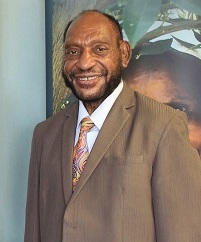
The Right Honourable Grand Chief Sir Peter Ipatas, KBE, GCL, MP is a Papua New Guinean politician and businessman, and is the current governor of Enga province. Ipatas has been re-elected to the parliament for four consecutive terms since 1997. He is commonly known throughout the country as the "Action Governor". Chief Ipatas is also known as the Father of Free Education Policy in the country. He first assumed office in 1997.
This is a list of members of the National Parliament of Papua New Guinea from 1997 to 2002, as elected at the 1997 election.
Events in Oceania, during 2019.

Sir Anthony Siaguru was a Papua New Guinean civil servant, lawyer, international diplomat, politician, sportsman and anti-corruption campaigner.
References
- 1 2 David Sitai National Parliament of the Solomon Islands
- ↑ "Solomon Islands-Papua New Guinea treaty signed after two-day delay", Radio New Zealand International (nl.newsbank.com), July 10, 1997.